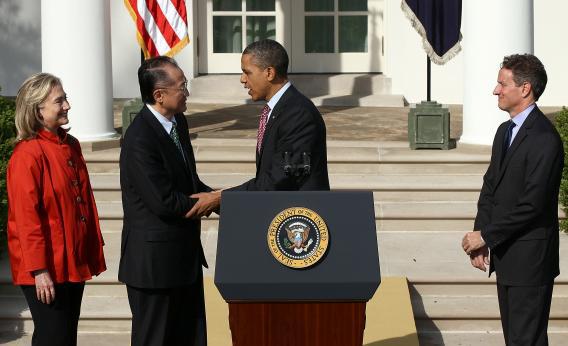There are times when living up to one’s rhetoric is the path of least resistance. Consistency, in economic policy, foreign affairs, and other politically tinged endeavors, is an overrated quality.
Nonetheless, when something self-affirming can be accomplished without damaging national interests, it should be embraced. The debate over whether the U.S. will continue to insist that its monopoly on leadership of the World Bank is a classic of the genre. The decision to essentially thumb its nose at the rest of the world and nominate an American is short-sighted.
Since the creation of the two global lenders of last resort—the World Bank and International Monetary Fund—in the years just after World War II, a gentlemen’s agreement between the U.S. and Europe essentially ensured that a European would run the IMF and an American the World Bank.
Bestowing—and that is the word—such power on the G6 may have made sense in 1975, when the grouping (U.S., Japan, Germany, U.K., France, and Italy) made up 85 percent of global GDP. But today, the world has changed enormously. With European nations looking to China rather than the U.S. for help weathering their sovereign debt woes, does it make sense to perpetuate this “fix” at the top of the bank?
Certainly, the U.S. nominee, Jim Kim, is qualified to lead the bank. The Dartmouth professor is no economist—but that’s not a requirement of bank leadership. He’s a great deal better than some other past choices who seemed to have won the job primarily because the U.S. president of the day had tired of the disastrous effect the person was having on American policy (Paul Wolfowitz and Robert McNamara come to mind).
Some Americans also argue that Europe, and not Washington, should be the first to relinquish the traditional lock on these top financial slots. The U.S., after all, hasn’t really lost much of its own share of global output when compared to Europe, which has gone from about 35 percent of global GDP in 1970 to just about 26 percent today.
Europe shrugged off such pressure last year, and Washington apparently feels that gives it the cover it needs to do the same. Only last summer, in the wake of the spectacular flame out of the IMF’s playboy director general, Dominique Strauss-Kahn, that institution not only reaffirmed Europe’s prerogative but even nominated DSK’s compatriot, Christine Lagarde, for the post. The argument that she would be the first female to occupy it doubtless left BRICS and other rising powers cold.
Yet Europe’s imperiousness last year is no excuse for the U.S. to live in the past. Even if the case for an American at the top of the World Bank is slightly stronger, the principle is equally flawed. No country has done so much to raise expectations of genuine global democracy as the United States—indeed, we created the U.N., the Marshall Plan, and the banks that grew out of these post-war reconstruction schemes.
So Obama missed a chance to lead from the front. It wouldn’t have won him any points at home—think Jimmy Carter and the Panama Canal—but playing the long game makes sense sometimes, and by insisting on an American nominee, he’s hardly won over any of his critics.
Alllowing a World Bank president to ascend from the world that is most relevant to the bank’s charter—the developing world—would have shown that Obama understands that the West no longer has any lock on the talents needed to drive intelligent global development and fiscal policy from the World Bank’s executive suite. If anything, the West’s dogma gets in the way of designing intelligent packages that meet the needs of countries that are in different stages of development than, say, the requirements of a bankrupt so-called advanced economy like Italy or Greece.
